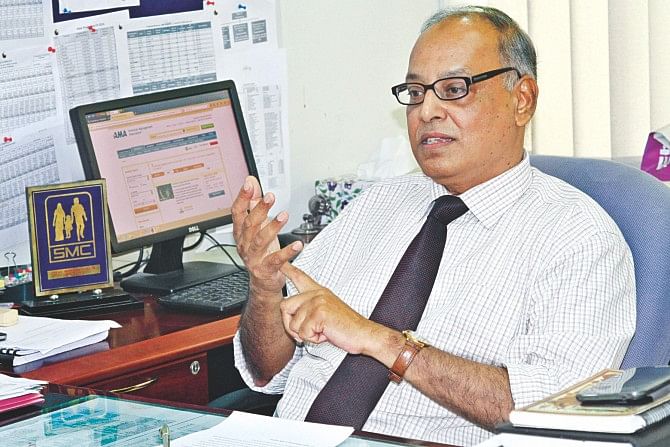SMC to launch for-profit venture to fund social projects

Social Marketing Company (SMC), a not-for-profit organisation, plans to set up a for-profit venture to finance its endeavours to improve the lives of the poor.
The new venture, SMC Enterprise, will market and distribute health and family planning-related products that SMC is now doing through its network. SMC Enterprise will focus on profit maximisation, which makes it different from non-for-profit SMC.
SMC Enterprise will also finance new projects such as hospitals and services to the poor, Ashfaq Rahman, managing director of SMC, told The Daily Star in a recent interview.
Financial sustainability, although achieved by SMC two years ago, motivated the organisation to set up the new venture, where it will have a 100 percent stake.
Revenues in 2012 from SMC's self-financed products were large enough to cover its non-programme related expenditures, according to Rahman. In other words, the not-for-organisation is “completely sustainable without external or donor support”.
SMC was established in 1974 as the Family Planning Social Marketing Project under a tripartite agreement between the Bangladesh government, US-based nongovernmental organisation Population Services International and the US government's aid agency USAID.
In 1990, the organisation was renamed the Social Marketing Company or SMC with a voluntary board of directors.
SMC today is one of the largest and most successful private sector social marketing organisations in family planning and child health globally, Rahman said.
It is a major contributor to Bangladesh's family planning programme, providing more than one-third of the contraceptives.
“We pioneered the large-scale use of lifesaving ORS (oral saline) in the country and operate one of the largest private sector ORS manufacturing facilities in the world.”
SMC's business operations are fully sustainable and, along with donor funds, contribute in the implementation of a number of initiatives designed to enhance social good, Rahman said.
At present, SMC is working on a project to help build bus stands for waiting passengers and provide latrine services and drinking water, in a bid to ease the sufferings of those who have to wait in long queues to get on a bus.
“SMC is also taking an active role in tree plantation focusing on creating a clean and green environment for our children in future,” he said, adding that the company plans to use some of the surplus funds from SMC Enterprise to expand its CSR activities.
It is structured and operates much like any commercial operation except that its objectives are to bring social good.
SMC's marketing strategy is based on the concept of cross-subsidisation, where revenues from high-priced profitable products are used to subsidise low-priced products to make them more affordable to the low-income group.
“We can sustain our low-priced brands without depending on donor commodity support.”
SMC's own distribution network is one of the largest in the country, with increasing access to products like contraceptives, ORS and Monimix through pharmacies, grocery shops and NGOs in remote corners of the country.
“Our marketing and communications are well-recognised and effective in generating demand and changing behaviour of our target groups. It is wide-ranging -- from brand promotion to generic communication, using both community mobilisation medium as well as mass media to reach our target audience.”
SMC also has a very strong training component that is primarily engaged in mobilising the private sector health providers in family planning and particularly in expanding the services of long-acting contraceptives like IUD and implants, diarrhoeal management, tuberculosis prevention and prevention of HIV and STIs, he added.

 For all latest news, follow The Daily Star's Google News channel.
For all latest news, follow The Daily Star's Google News channel. 



Comments